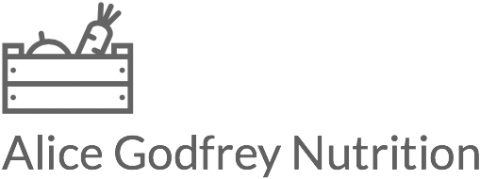Written for Thyroid UK Harmony magazine May 2023
by Alice Godfrey

Do you find yourself sleepy in the afternoons or falling asleep in front of the TV? Do you crave carbs and end up eating sugary foods because you’re desperate for something to perk you up?
The balance of sugar in our blood has a massive effect on our energy levels and can also influence a multitude of things including mood, mental health, weight loss and even hair loss.
It’s essential to pay attention to how we are managing blood sugar when we have a thyroid condition.
What is blood sugar?
Whenever we eat or drink anything, our blood sugar goes up. Then the pancreas releases insulin which allows the blood sugar to enter the cells so the blood sugar levels go down again. This signals insulin levels to decrease.
When most of what we’re eating in a meal or snack is carbohydrate (eg. bread, pasta, rice, starchy vegetables, pastries, anything sweet), we get a blood sugar spike. If this happens too often, the pancreas over compensates and releases too much insulin so what follows is very low blood sugar. When blood sugar is too low the brain and body’s supply of energy is inadequate so what can follow is fatigue, brain fog and low mood. The adult brain uses 20% of the body’s energy (up to 60% in a 5 year old!) and if its source of energy is depleted this can affect memory, brain function and mental health long term.
Extreme fluctuations in blood sugar (from consistent consumption of high carb snacks and meals) put pressure on the body’s endocrine system to correct them, and this can cause imbalances in thyroid hormones. When blood sugar is low, we are put into fight or flight mode (the ‘sympathetic’ mode of the nervous system). Thyroid function, along with digestion, immunity, hormone balance and many other important body functions are put to one side while the body prioritises ‘fighting’ or ‘fleeing’. (Mostly, in 21st century living, there is no actual fighting or fleeing.)
Hypothyroidism also affects blood sugar balance because it slows the response of insulin which makes getting energy from food a slower process (as it is insulin that allows the glucose into the cells). This feels like hypoglycaemia (chronic low blood sugar) and the brain can respond this way and alert the adrenals. When this happens consistently, communication between the brain and the adrenals suffers (which can affect the stress response).
As you can see, when there is a blood sugar imbalance, there are many knock on effects. And it can be hard to get out of the cycle – you eat a meal high in carbs, your blood sugar goes very low, and you crave carbs to get it up again, and so the cycle begins again.
Insulin Resistance
This can happen when insulin no longer works as well as it should and it can happen as a result of eating a diet high in carbohydrate. The pancreas keeps releasing insulin to balance the blood sugar and it releases it so frequently at such a level that eventually the cells become resistant and it doesn’t have the required effect. This makes it more difficult to correct a blood sugar imbalance and in severe cases it can lead to diabetes.
How do I know if I have a blood sugar imbalance?
You can look at your diet first of all. Is it carb heavy? Do you skip meals? This will mean periods of low blood sugar.
Also, these can be signs that there is an imbalance:
Feeling more energised after meals
Feel sleepy after meals
Constant hunger
Cravings
Feeling tired in general
Feeling jittery or weak
Poor memory
Difficulty losing weight
(Of course, there can be other reasons for these things too)
What can I do?
It can be complex to correct a chronic blood sugar imbalance but there are certain things that can get you started and these may be enough for many people.
I’m not against eating carbohydrates (far from it, we need them for energy!) but proteins and healthy fats are our friends here. When we eat them, blood sugar goes up gently, doesn’t spike, and comes down gently again (and doesn’t go too low) so we need them for balance.
Here are 6 steps that will help up moderate our carbohydrate intake and help us have more balanced blood sugar:
- Have a protein breakfast like eggs, a protein smoothie or protein pancakes
- Have protein-rich snacks rather than sweet ones
- Stop having sweet drinks – these are so easily absorbed that they spike the blood sugar the most dramatically
- Only have sweet foods straight after a protein-rich meal (less impact on your blood sugar)
- Include lots of fibre in the form of vegetables – they will slow the sugar release and mean less impact on your blood sugar
- Keep well hydrated as this also has the effect of slowing the blood sugar release
I advise working towards each of these steps but start with just a couple and you’re likely to see a big difference in your energy levels, your moods and your cravings.
by Alice Godfrey

